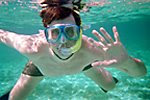Anyone who uses the Internet, so by definition all who are reading this blog, knows there are inherent personal risks when online. Social networking sites (Facebook, Twitter, MySpace) have compounded those risks by its very nature of share, share some more, share even more, whoa, okay, that's a little too much info!
In all seriousness, we've heard the horror stories, and we know that just like in the real world, on the Internet there are bad people out there who want to do bad things to good people. There are many resources online that offer great safety tips for surfing the web, even specific tips for safe social networking.
Participating in social media sites or running an online community for Special Olympics presents a unique challenge that I've fielded a few questions on from communications program staff recently that made me realize we really need some specific tips for our community.
First, it's important to know that many Special Olympics athletes and others with intellectual disabilities are already participating online in social networking sites and they enjoy doing it just like anyone else. I've seen some really talented athletes from Special Olympics even create groups on Facebook, create an application on Facebook, create and share regular vlogs on YouTube, many athletes are on Twitter, several have even shared songs or poems they've created on MySpace or iTunes and there are dozens of athletes on our own Fan Community that pose legitimate and thought provoking questions about Special Olympics rules, policies and procedures.
That said, the unique challenge that presents itself to Special Olympics staff, family members and loved ones of Special Olympics athletes is that because we will always advocate inclusiveness and equal opportunity for all people, we must be extra vigilant to make sure the athletes are as safe online as they are at a Special Olympics event, in school or in their every day lives.
For many people, the Internet and especially social media, is unfamiliar terrain when it comes to asking the question "just how safe are we?" A lot of concern has been expressed about what it means to "friend" someone or "follow" someone and what if an athlete allows the wrong person to be their "friend," are they safe? What if they participate in a message board conversation and people pick on them? What if the athlete is too trusting and gives out personal information that they should keep private?
These are all very legitimate and good concerns and I want to try and throw out a few suggestions, tips and ideas to help us all navigate these sometimes unsteady waters.
First and foremost, it's important to forget the platform of the computer/Internet/Facebook, or what have you, and remember that being online is about interaction. While the "anonymity" of the Internet may seem like a safety blanket, its a false sense of security. You should consider your interactions online to be the same as interactions you'd have in person. If a stranger came up to you on the street and says they need five minutes of your time and that if you can give them $100 they'll bring you $10,000 back tomorrow, chances are you'd say 'no thank you' and keep walking. So if you get an email or an instant message from a stranger saying you inherited money from a long lost Nigerian relative and that if you can deliver a $1,000 processing fee to them they will send you a $1 million inheritance check, you should do the same thing you would on the street, walk away (in this case hit "delete").
My example is contrived and may seem ridiculous, but you'd be surprised how many people fall for these widely known and blatant phishing scams. But as you can see, a little common sense can go a long way. To that effect, below are some universal tips (common sense) about staying safe online.
So while those basic tips cover general personal safety on the Internet, let's cover a few tips specific to Special Olympics and our athletes.
Much like the way "real life" examples applied in the information above, it's important to remember that the information in our Protected Behaviors resource can often be applied to interactions online.
Five Online Tips for Special Olympics Social Media:
As you can see, safety on the Internet is simply an extension of the same common sense, with a little effort of engagement, that we all put forth in our daily lives in order to share with our friends, family members, loved ones and Special Olympics athletes. With a little bit of effort to get beyond the intimidation factor of "THE INTERNET" everyone, including Special Olympics athletes, can enjoy all the great resources and community that the online space offers.
Did I miss anything? Offer your own tips in the comments below!
Wednesday, June 3, 2009
Subscribe to:
Comments (Atom)
